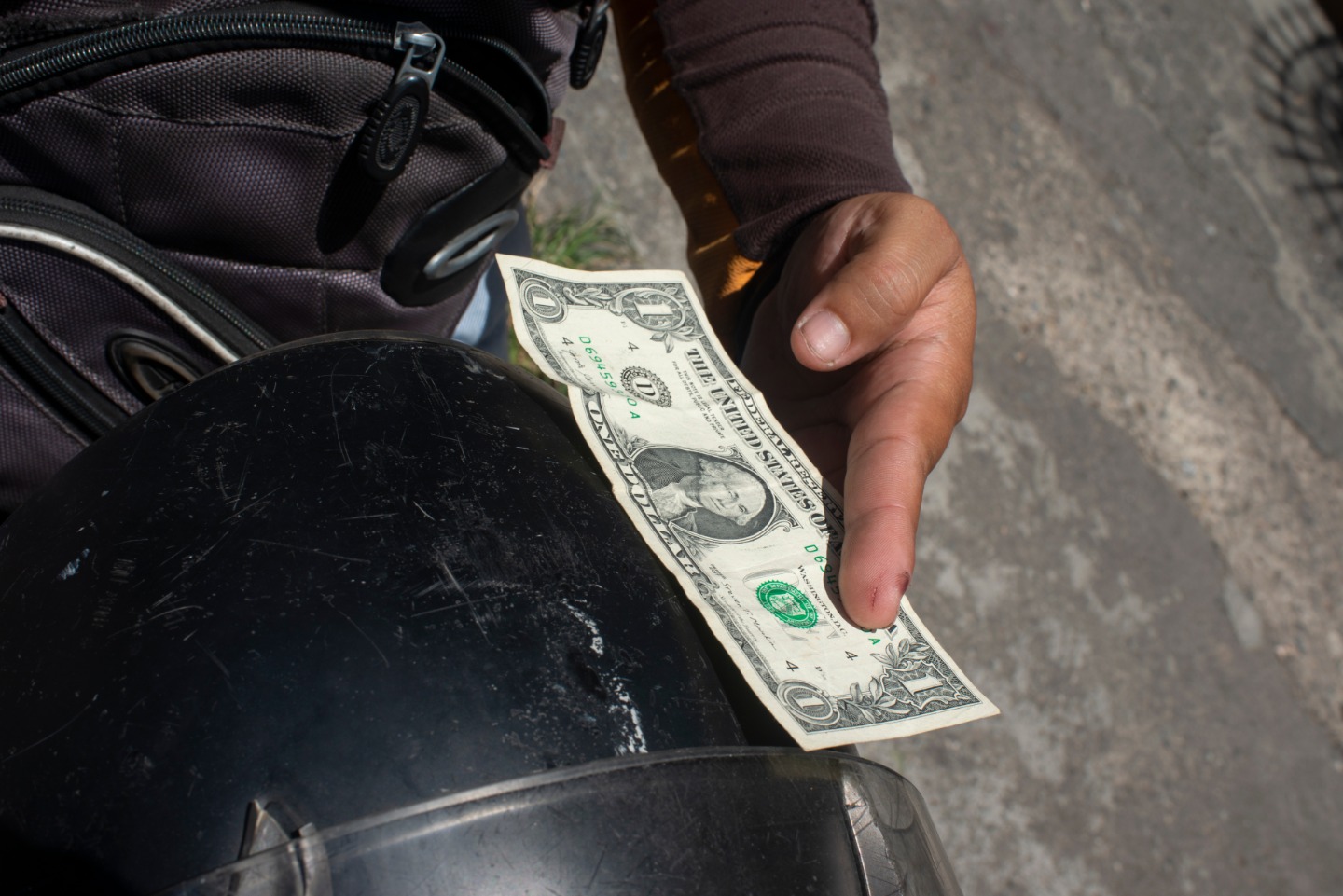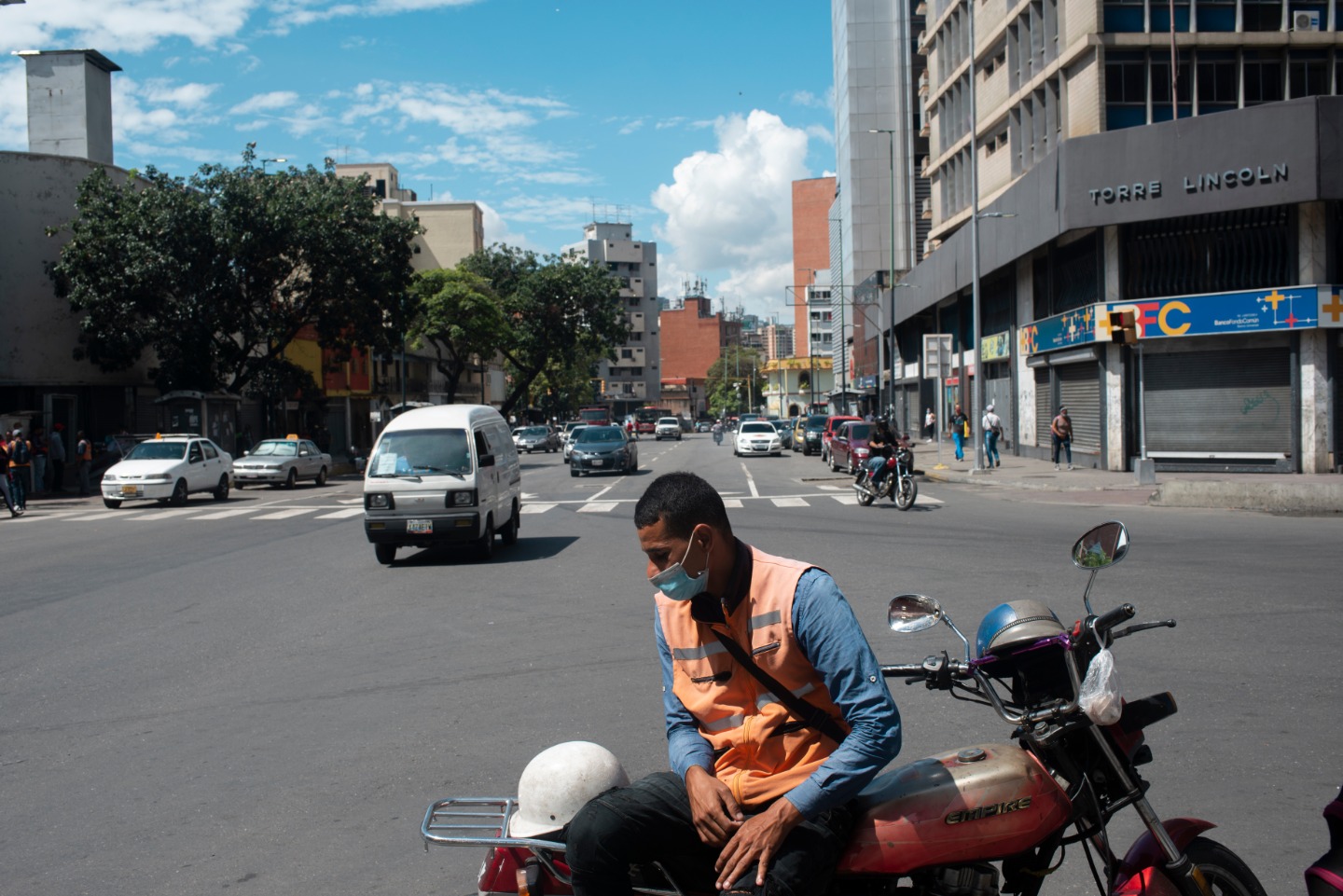The mid-morning sun scorches the pavement as Yonder, a 35-year-old motorcycle taxi (mototaxi in Spanish) driver, navigates the windy backroads of Caracas in search of gasoline.
He passes a gas station with a line of waiting vehicles stretching over a mile long. As he drives by, he sees the attendees sitting in the shade, waiting. There is no gas here, but those in line are waiting in hope of a delivery.
“It’s not my day,” he says, referring to new government rationing measures for gas, introduced at the beginning of June. It allows citizens to get affordable gas once a week, based on the last number of their license plate.

Around the corner, he pulls up to another station. There’s no line, but National Guard officers stand watch. Yonder pulls out a worn one dollar bill from his wallet and furrows his brow. “Well, this will have to last,” he says.
Motorists like him are struggling to cope with the new normal in Caracas, the capital of a country that has some of the world’s largest oil reserves. Cheap, subsidized gas here has always been a given, despite the unprecedented socio-economic crisis that began in 2014.
But grave mismanagement of the state oil production company PDVSA over decades has caused a historic drop in oil production that, paired with U.S. sanctions, is leaving the capital without gas in the middle of a global pandemic.
Venezuela adopted a militarized lockdown in response to coronavirus that severely – and conveniently – restricts movement as gas supplies start to dry up. But for mototaxi drivers, there is no choice. If they stay off the streets, they won’t eat.
In Plaza Venezuela, the once bustling downtown intersection of Caracas, the streets are empty except for police enforcing COVID-19 restrictions, dispersed groups of essential workers and small pockets of mototaxi drivers yelling out “Moto, moto, moto” to passers-by.
Dublas, a 33-year-old driver, is out in his corner of the plaza all day, every day waiting for somebody to need a ride. On a good day, he may get one or two customers. On others, he goes home without making a cent.
Like many, Dublas left his minimum wage job to become a mototaxi driver back in 2014, when hyperinflation began to soar, ravaging Venezuela’s economy. His motorcycle was relatively affordable, and the job allows drivers to make their own hours and earnings. But the combination of the lockdown and gas shortages has the likes of Dublas fighting for survival. Many told VICE News that gas scarcity was being exploited by local mafias and corrupt government officials.

“We tried to organize ourselves, making a list of people who were waiting in lines overnight at the gas station. But then the police would come around three in the morning and try to get us to leave. Sometimes fights would break out. Police would even shoot their guns into the air to scare us,” said Yonder.
Wilmer, another taxi driver, said, “The National Guard do whatever they want. I saw a ‘VIP’ line where cars would pay between $30-$50 to get their gas first, pushing all of us to the back of the line.”
Thanks to a deal with Iran earlier this year, ships of gasoline imports arrived on Venezuela's shores on May 24th. With at least some gas to go around, a dual market has arisen. Cheap, but hard to get, subsidized gas subject to rationing, or other gas stations selling fuel at higher ‘international’ prices.
Venezuela’s subsidized gas system requires each citizen to be registered via the “Sistema Patria” (Homeland System) digital platform or to hold an account with a state-run bank. For mototaxis, given a ration of 60 liters per month, it costs 50,000 BsS (around 15 cents) to fill one tank. While this ration is far less than the average driver's needs on a monthly basis, in principal it’s meant to alleviate shortages and black-market dealings.
But gas bought at international prices - 50 cents per liter, which is expensive for average Venezuelans - is becoming only real option as subsidized gas is increasingly hard to find. That’s a massive price hike in a country where, historically, gasoline was practically given away for free.
“Now the mafia is them [the government] - it's just more obvious. You go to the gas station, pay in dollars, done. It's all a business, everything for them is a business. You´ll see - soon there won´t be any gas, except for at these international spots. Everyone just wants dollars,” Yonder explained. The socio-economic crisis in Venezuela has led to astronomical hyperinflation, leaving the local currency - the Bolivar - worthless. Since the beginning of 2019, much of the economy has begun to operate solely in US dollars.
Mototaxi drivers that spoke to VICE News all complained about this mismanagement of gasoline, and said it’s nearly impossible to get the affordable gas government rations promise. Rumors are circulating that subsidized gas could soon be completely gone. Some drivers said the government system is already taking their monthly rations away altogether.
“I only got gas twice this month and the last time I went, the service attendee told me I only had four liters left. There was no way [that was true]. But who am I supposed to complain to? I have to either buy in dollars or not work until next month...there's no option for me,” Javier, another driver said.
“The mototaxi profession has all but died,” Yonder said, referring to the mass exodus of many of his cohorts who have already migrated due to the crisis. “The few of us who stayed are now being hit with this craziness. We are just trying to survive.”
Cover: Yonder, a mototaxi driver in the Venezuelan capital, Caracas, said that his trade is all but dead due to gas shortages, corruption and the COVID-19 lockdown. Credit: Lexi Parra for VICE News.
from VICE US https://ift.tt/3jxGnwm
via cheap web hosting
No comments:
Post a Comment